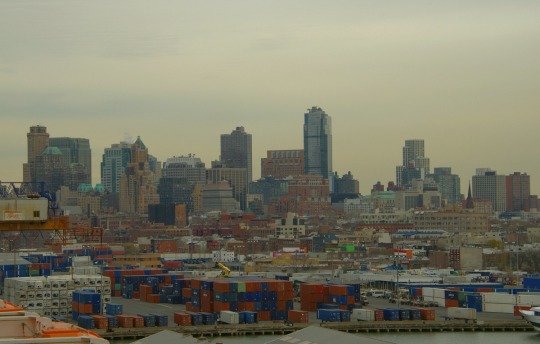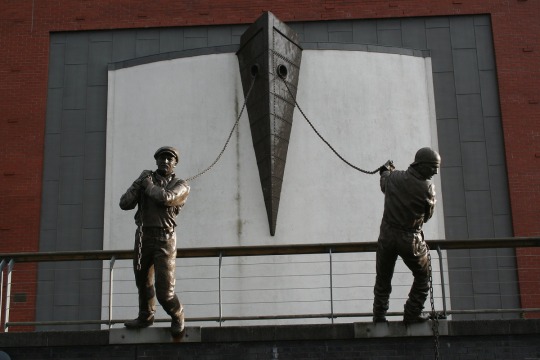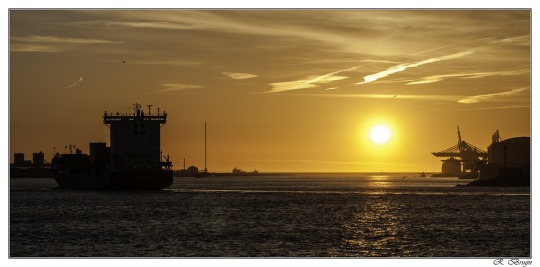#want to add two songs about the port of Genova
Explore tagged Tumblr posts
Text
The Port & the City

Buenos Aires, photo by lasgalletas (Creative Commons CC BY-NC 2.0)
Introduction
City of witches and of asphalt, port with no exit to the sea! — La Portuaria, from the port of Buenos Aires
Some cities have a port, and some port cities have a port culture. That's how I call it, anyway. It's a very special thing. It's created by the furious economic activity that concentrates around the coming and going of ships, cargo, and people. A port needs to cater to all of that, the ships and the cargo, the shipowner and the dockworker, the captain and the deckhand, the tourist and the sailor and the fisherman. And that transforms the entire city.
Where a port city meets the sea, there's shipping companies, travel agencies, imports/exports, truck companies, posh hotels, shitty hotels, fancy bars, seedy bars, brothels, strip clubs, theatres, restaurants, casinos, bookshops, tool shops, souvenir shops, fishing supplies, and fresh fish. There's peddlers and businessmen, porters and accountants, all sorts of people, and they all mingle. They have to! The port's there!
Port cities have their own landmarks and geography, with docks, wharfs, piers, depots, gates, shipyards, and people can orient themselves by relation to the water.

New York City, photo by Kari Nousiainen (Creative Commons CC BY-NC 2.0)
Crime
My gold watch and my pocketbook and lady friend were gone And there was I, Jack all alone, stark naked in the room — the port of New York City
Port cities attract furious criminal activity. Firstly and obviously, everything that's smuggled will be smuggled through here, from cocaine to counterfeit handbags to guns to oil. (I mean crude/refined oil, though with the prices we've seen lately, olive oil is equally plausible.) Port authorities, customs, shipowners and workers, all can have a hand in the pie, a little finger or both hands shoulder-deep, depending on how high up the ladder they are.
Second, ports are always full of newcomers, sailors and passengers, and all newcomers are potential marks. Con artists, scammers, and grifters of all sorts can ply their trade here. There's also a lot of shilling for more or less legitimate businesses (come buy this, sir! rent a room here, ma'am! oh but you must have a drink there, buddy!), and peddling less then legitimate goods (may I interest you in a fine watch? Rayban glasses, I have Rayban glasses! 100% genuine!). And then there's good old pickpocketing. Although in most cases, pickpockets are not allowed to operate within the port itself: it's bad for everyone else's business, and unlike cops, "everyone else" can actually enforce that.
And third, there's the entertainment sector: the trifecta of night life, sex work, and gambling, all going hand in hand with the sale and consumption of drugs and booze. Expect the port city to be much more entangled in all that than other cities, and the port itself to attract the bulk of it, or the worst of it. Things that are theoretically illegal might be tolerated here, things that are heavily regulated elsehwhere might follow their own rules here, and things that are otherwise unheard of can be found here. What are you into? Step right up but beware: the large print giveth and the small print taketh away.
The upshot of all this is that people in the port's vicinity (not the whole city, though) are more likely to be involved, or at least personally know someone who's involved, in profoundly shady and/or illegal business. And that certainly affects the culture. Breaking the law is more "eh" than "oh my!".

Clydebuilt Museum, photo by Paisley Scotland (Creative Commons CC BY 2.0)
Politics
All my life I've lived beside the waters that they call the Clyde I build the ships and watch them glide down the Broomielaw, sir Trudge to work in sleet and rain, labour for another's gain know yer place and don't complain, that's the rich man's law, sir — Alistair Hulett, from the shipyards of Glasgow
A port displays furious political activity. Unions are strong here, because labour is not only working, it's working hard, manually, in the same spaces (so they can talk about it!), and facing the same dangers to life and limb. Working on the docks, handling cargo containers, and ship-building and maintenance are very hazardous jobs (scrapping even more so, I'd say dramatically so), and under these conditions, it's easier to spot the enemy. Not automatic though. Port cities are traditionally, but not unconditionally, strongholds of the left.
Today, it's extremely important for the left to take the ports, because if it doesn't the fascists will. The workforce here has significant ethnic diversity, coming both from inland (immigrants and local minorities) and from the sea (sailors who go around the world sometimes end up working in random ports). So basically, this either goes "proletarians of the world unite" or "foreigners are stealing our jobs", no middle ground.
By the way, if all your knowledge about port unions comes from The Wire, or worse (for our older readers) from On the Waterfront, please be aware that these are slanted depictions, and you don't actually know anything. [They're not equally slanted, The Wire is nowhere near the other one's level of shameless propaganda, nor so completely divorced from reality. I mean yes, unions can be involved in shady business; so can literally everyone else in the port. But On the Waterfront, without the slightest exaggeration, is to American organised labour what Birth of a Nation is to Black Americans.]

Valparaíso, photo by [o] Rolando Vejar (Creative Commons CC BY-SA 2.0)
Culture
Amo el amor de los marineros que besan y se van. Dejan una promesa. No vuelven nunca más. — Pablo Neruda, from the port of Valparaíso
The port's culture seeps through the rest of the city. This is where sailor lore gets created and spread, and a port by definition loves travel and the ocean. Many non-sailors fall for it hook, line and sinker, and write poems and sing songs and their heart swells at the mere thought of sailing. But their fascination is often rose-tinted, whereas people who make a living from the sea typically have a love/hate relationship with it.
Maiden voyages are important occasions in shipbulding ports. A ship's last voyage, before it goes to scrap, is also memorable. If the ship regularly docks there, it will be the talk of the town, and if it's a passenger ship [this assumes a geography with regular passenger runs], a whole mess of people will be sharing stories and memories, waving it farewell, shouting, applauding, crying a little. It can get very emotional.
There's also a silly sort of localism/professional pride going on, where even the port's accountants, who've never set foot below decks IF they've actually boarded a ship, feel like they're a different species of accountant, inexplicably tougher and saltier than their more, er, inland colleagues. No matter who you are and what you do, it's badge of honour to say you're from and/or work at the port, like you're automatically endowed with tenacity and street smarts. It doesn't make sense, but there you have it.

Rotterdam, photo by MaxAmy Photography (Creative Commons CC BY-ND 2.0)
Desire
In the port of Amsterdam there's a sailor who dies Full of beer, full of cries, in a drunken town fight In the port of Amsterdam there's a sailor who's born On a hot muggy morn by the dawn's early light — Jacques Brel (in David Bowie's adaptation), from the port of Amsterdam
A port is filthy, grubby, and hopelessly romantic. If it faces somewhat west, it's on fire every sunset. Silhouettes of gigantic cranes are framed by red clouds like alien tripods. The sun sinks into the ocean, and tell me, in the whole wide earth, is there a sweeter sight? Ships approach like sea beasts, and dock in their usual place like old friends.
A port carries the whiff of grease and petrol, the cool sea breeze, and the incessant sounds of waves and engines and – most of all – people. A port IS people, passing. And tell me, in the whole wide world, is there anything more exciting and heartwrenching than people passing? A port city can fill you with wanderlust and feel like a prison, or a warm welcome, or a devastating farewell.
And if you point a gun to my head and force me to describe a port in a single word, I'll have to say: desire.
Love me, leave me, hold me tight, walk away, forget. Look at how I broke inside, and how the sea has swelled! It's pouring out a riot of colours, scents, and lights, and in the city's gutter it's building paradise. — Ξύλινα Σπαθιά, from the port of Thessaloniki

Thessaloniki, photo by Arend Kuester (Creative Commons CC BY-NC 2.0)
La Portuaria - Un dia cualquiera (El bar de la calle Rodney) | the port of Buenos Aires
Ξύλινα Σπαθιά - Ρόδες | the port of Thessaloniki
Tom Waits - Step right up
Finbar Furey - New York City girls | the port of New York
The Dubliners - Go to sea no more | the port of Liverpool
Alistair Hulett - The Old Divide and Rule | the shipyards of Glasgow
The Dreadnoughts - Roll Northumbria | the shipyards of Tyne
The Longest Johns - Fire & flame | the port of Halifax
Maria del Mar Bonet - Merhaba | the ports of the Mediterranean
Cesária Évora - Mar de canal | the port of Mindelo
Susana Baca - Los marineros | the port of Valparaíso
Παντελής Θαλασσινός - Άσπρο καΐκι στη Νέα Πέραμο | the little port of Nea Peramos
Jacques Brel - Amsterdam | the port of Amsterdam
Social Waste - Kasbah | the port of Algiers
Πάνος Κατσιμίχας - Ο πιλότος Νάγκελ | the port of Colombo, so far from Lofoten
Ξύλινα Σπαθιά - Φωτιά στο λιμάνι | the port of Thessaloniki
#want to add two songs about the port of Genova#by folk singer and songwriter fabrizio de andré#Crêuza de mä#La città vecchia#🎧
62 notes
·
View notes